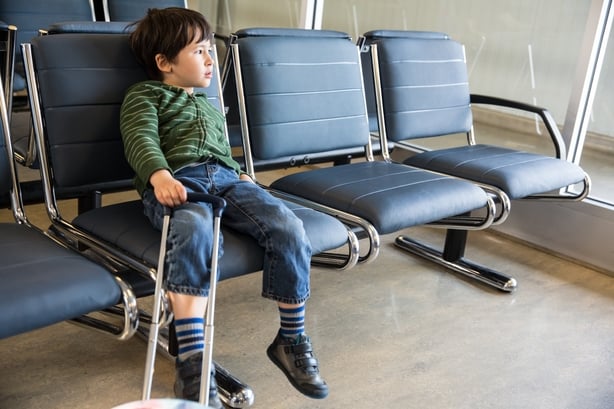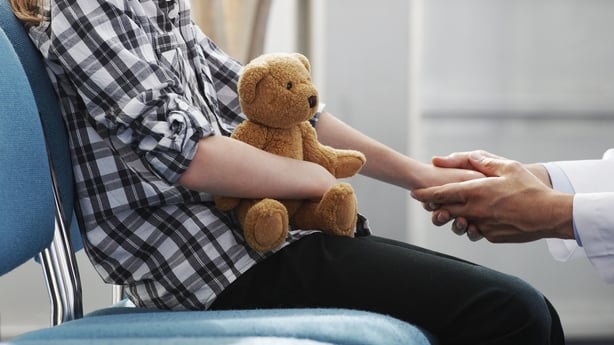Analysis: Travelling abroad for treatment for a child with additional needs is a big decision and often a last resort for families
Public healthcare services for children with additional needs in Ireland are in crisis. Extensive waitlists for medical procedures and therapies such as occupational therapy, physiotherapy and speech and language therapy leave many families really frustrated. More and more feel forced to source these services privately in Ireland or consider their options abroad.
Research in this area is very limited with no official figures on the numbers of Irish families now bringing their child abroad to get therapy or undergo surgery. There isn't a parent in the country that wouldn’t do whatever they could for their child. That said, travelling abroad to get treatment is a big decision. Here are eight questions to consider.
Is your child fit to travel?
Your child’s safety is the very first priority. Research shows that people with underlying health problems are more likely to become ill while traveling than their peers. Always check with your doctor that your child is 'fit to travel’ and ask for a letter confirming this. Even if your child has private health insurance for ‘overseas travel’, the insurance company may not honour it unless you have this letter.

Will the treatment work?
Unfortunately all that glitters isn't gold and websites selling therapies will inevitably be biased so you’ll need to do your homework. Find out if this treatment works for someone your child’s age, the severity of their problems, and their specific diagnosis.
Don't confuse under-staffed Irish healthcare teams with teams that don’t care. They do care and by keeping communication open with them, you can get much needed guidance. They can also direct you to reputable websites for independent reviews.
Where should you go?
Speak to other families who have already had a successful experience abroad. If you have a choice, choose a country where the medical staff can speak English, and only link with well-established, reputable clinics and hospitals. Again, a healthcare professional in Ireland who you trust may provide great insight.
We need your consent to load this rte-player contentWe use rte-player to manage extra content that can set cookies on your device and collect data about your activity. Please review their details and accept them to load the content.Manage Preferences
From RTÉ Radio 1's Ray D'Arcy Show, how to keep kids entertained while they wait for treatment in hospital
Who will travel?
Ideally two adults should go as it would be a lot for one parent to shoulder alone. Be kind to each other, everyone will be doing their best.
Your family dynamics and disposable income will influence whether you bring siblings. They may be a great distraction for your child but of course will also need love and attention.
How will you travel?
If you can, choose a destination with direct flights of short duration, at times that suit your child’s routine. Request ‘special assistance’ for your child (if they’ll need it) when you’re booking the flights. You can then go directly to the OSC desk for assistance when you arrive in the airport.
Remember to bring your child’s medicine in your carry-on luggage so you don’t miss any doses. In order to get it through security, you’ll need a letter from your child’s doctor detailing the medications you’re carrying. A child’s walking frame can be brought on to the plane and stored in the hold but larger equipment such as wheelchairs need to be checked in and therefore are worth insuring. Be proactive and always bring an emergency care plan for your child.

What can you expect?
If you’re not regular travellers, plan a mini-trip to another Irish city for a weekend to identify teething problems before you embark on a complex international journey. To manage your expectations, clarify with the team what improvements you can expect to see in your child by the time you return home.
While away, consider setting up a WhatsApp group so you can provide updates to family and friends all in one go. When you get home, will you be expected to do a home programme or have input from your local healthcare team? Will you be expected to return to their centre again for follow-up? Decide what you can realistically commit to.
What if my child gets sick while abroad?
Be aware of what hospitals are near you. In Europe, have your European Health Insurance Card to access public hospital care for free or at a reduced rate. If travelling outside Europe, be very careful to confirm your healthcare options before you go.
Speak to other families who have already had a successful experience abroad
Most private health insurances bought in Ireland only cover you abroad for emergency admission to hospital for illness or injury, and don’t cover planned treatments overseas for pre-existing conditions. Your child’s health insurance might not even include emergency cover for their underlying health condition. Although it’s tempting to buy additional travel insurance, this cover often excludes people going abroad for medical treatment. Check directly with your insurance company.
What will it cost?
Costs will vary considerably. Some specific schemes are worth looking into but there’s no guarantee of financial support. For example, you can apply for the Treatment Abroad Scheme if the treatment is not available in Ireland. Alternatively, if your child is waitlisted for the treatment in Ireland, check out the Cross Border Directive. Failing that, you may at least be able to get tax relief on some expenses so keep your receipts.
Travelling abroad for treatment is a big decision and is often a last resort for families. This list is not exhaustive but hopefully will offer you some guidance on this poorly lit path.
The views expressed here are those of the author and do not represent or reflect the views of RTÉ





